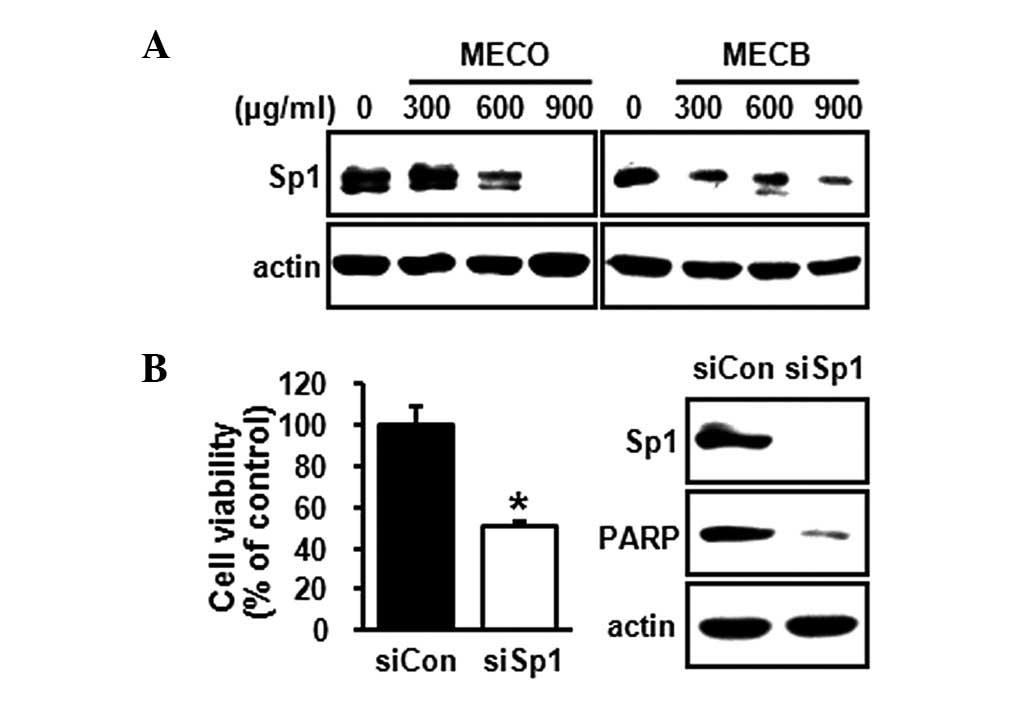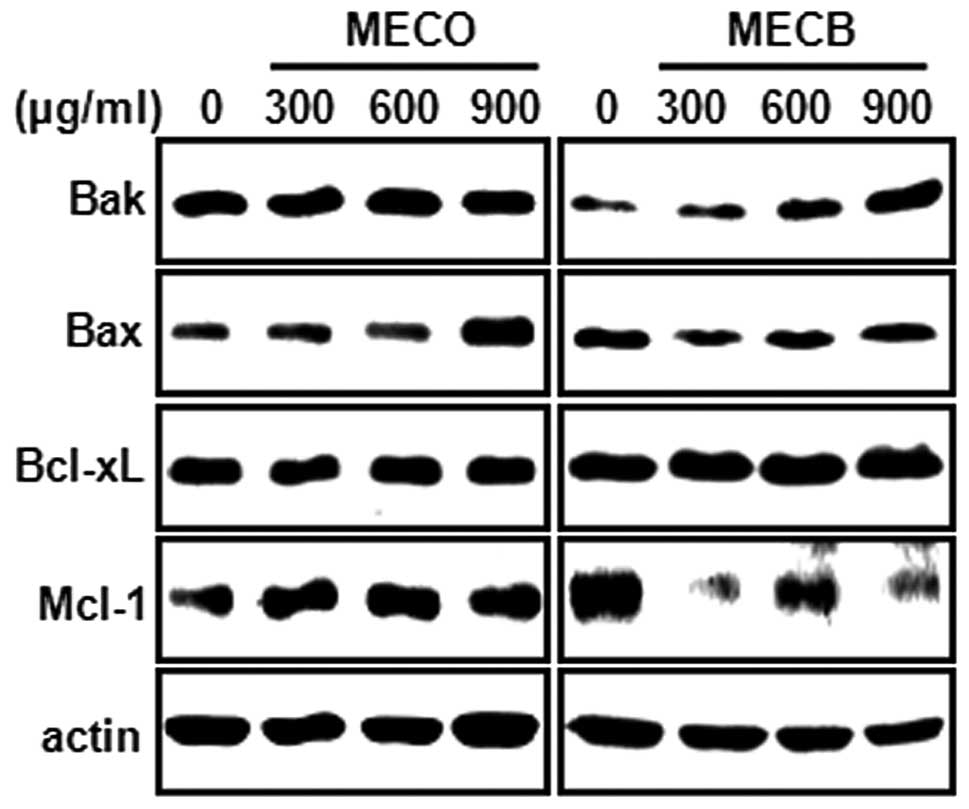|
1.
|
Fulda S: Modulation of apoptosis by
natural products for cancer therapy. Planta Med. 76:1075–1079.
2010. View Article : Google Scholar : PubMed/NCBI
|
|
2.
|
Nobili S, Lippi D, Witort E, et al:
Natural compounds for cancer treatment and prevention. Pharmacol
Res. 59:365–378. 2009. View Article : Google Scholar : PubMed/NCBI
|
|
3.
|
Amin AR, Kucuk O, Khuri FR and Shin DM:
Perspectives for cancer prevention with natural compounds. J Clin
Oncol. 27:2712–2725. 2009. View Article : Google Scholar : PubMed/NCBI
|
|
4.
|
Safe S and Abdelrahim M: Sp transcription
factor family and its role in cancer. Eur J Cancer. 41:2438–2448.
2005. View Article : Google Scholar : PubMed/NCBI
|
|
5.
|
Black AR, Black JD and Azizkhan-Clifford
J: Sp1 and krüppel-like factor family of transcription factors in
cell growth regulation and cancer. J Cell Physiol. 188:143–160.
2001.
|
|
6.
|
Sankpal UT, Goodison S, Abdelrahim M and
Basha R: Targeting Sp1 transcription factors in prostate cancer
therapy. Med Chem. 7:518–525. 2011. View Article : Google Scholar : PubMed/NCBI
|
|
7.
|
Zhang J, Zhu ZG, Ji J, et al:
Transcription factor Sp1 expression in gastric cancer and its
relationship to long-term prognosis. World J Gastroenterol.
11:2213–2217. 2005. View Article : Google Scholar : PubMed/NCBI
|
|
8.
|
Wang LW, Li Q, Hua ZL, et al: Expression
of transcription factor Sp1 in human gastric cancer tissue and its
correlation with prognosis. Zhonghua Zhong Liu Za Zhi. 29:107–111.
2007.(In Chinese).
|
|
9.
|
Jia Z, Gao Y, Wang L, Li Q, et al:
Combined treatment of pancreatic cancer with mithramycin A and
tolfenamic acid promotes Sp1 degradation and synergistic antitumor
activity. Cancer Res. 70:1111–1119. 2010. View Article : Google Scholar : PubMed/NCBI
|
|
10.
|
Chintharlapalli S, Papineni S, Ramaiah SK
and Safe S: Betulinic acid inhibits prostate cancer growth through
inhibition of specificity protein transcription factors. Cancer
Res. 67:2816–2823. 2007. View Article : Google Scholar
|
|
11.
|
Chadalapaka G, Jutooru I, Chintharlapalli
S, et al: Curcumin decreases specificity protein expression in
bladder cancer cells. Cancer Res. 68:5345–5354. 2008. View Article : Google Scholar : PubMed/NCBI
|
|
12.
|
Fang Y, Yu Y, Hou Q, et al: The Chinese
herb isolate isorhapontigenin induces apoptosis in human cancer
cells by down-regulating overexpression of antiapoptotic protein
XIAP. J Biol Chem. 287:35234–35243. 2012. View Article : Google Scholar
|
|
13.
|
Lou Z, O’Reilly S, Liang H, et al:
Down-regulation of overexpressed sp1 protein in human fibrosarcoma
cell lines inhibits tumor formation. Cancer Res. 65:1007–1017.
2005.PubMed/NCBI
|
|
14.
|
Shin JA, Kim JJ, Choi ES, et al: In vitro
apoptotic effects of methanol extracts of Dianthus chinensis
and Acalypha australis L. targeting specificity protein 1 in
human oral cancer cells. Head Neck. June 25–2012.(Epub ahead of
print).
|
|
15.
|
Wang L, Wei D, Huang S, et al:
Transcription factor Sp1 expression is a significant predictor of
survival in human gastric cancer. Clin Cancer Res. 9:6371–6380.
2003.PubMed/NCBI
|
|
16.
|
Wang XB, Peng WQ, Yi ZJ, Zhu SL and Gan
QH: Expression and prognostic value of transcriptional factor sp1
in breast cancer. Ai Zheng. 26:996–1000. 2007.(In Chinese).
|
|
17.
|
Guan H, Cai J, Zhang N, et al: Sp1 is
upregulated in human glioma, promotes MMP-2-mediated cell invasion
and predicts poor clinical outcome. Int J Cancer. 130:593–601.
2012. View Article : Google Scholar : PubMed/NCBI
|
|
18.
|
Chen F, Zhang F, Rao J and Studzinski GP:
Ectopic expression of truncated Sp1 transcription factor prolongs
the S phase and reduces the growth rate. Anticancer Res.
20:661–667. 2000.PubMed/NCBI
|
|
19.
|
Shin JA, Shim JH, Choi ES, et al:
Chemopreventive effects of synthetic C-substituted
diindolylmethanes originating from cruciferous vegetables in human
oral cancer cells. Eur J Cancer Prev. 20:417–425. 2011. View Article : Google Scholar
|
|
20.
|
Shin JA, Shim JH, Jeon JG, et al:
Apoptotic effect of Polygonum Cuspidatum in oral cancer
cells through the regulation of specificity protein 1. Oral Dis.
17:162–170. 2011.
|
|
21.
|
van Delft MF and Huang DC: How the Bcl-2
family of proteins interact to regulate apoptosis. Cell Res.
16:203–213. 2006.PubMed/NCBI
|
|
22.
|
Schmidt T, Korner K, Karsunky H, et al:
The activity of the murine Bax promoter is regulated by Sp1/3 and
E-box binding proteins but not by p53. Cell Death Differ.
6:873–882. 1999. View Article : Google Scholar : PubMed/NCBI
|


















